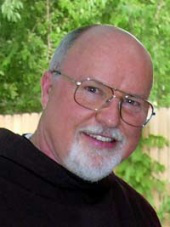‘God comes to us disguised as our life’ - Richard Rohr at Greenbelt

Fr Richard Rohr
In a series of four talks at this year’s Greenbelt Festival, Richard Rohr, a Franciscan priest and the founder and director of Action and Contemplation in Albuquerque, New Mexico, addressed his large audiences on the Greenbelt theme for the year, ‘the art of looking sideways’. Looking sideways, he argued, means developing a ‘non-dualistic mind’. This is a way of seeing that has the capacity to transform our relationship to the Bible, the Church, ourselves and Christ (the topics of the four talks). Rohr is expansive, lucid, enthusiastic, and brings a refreshing message.
In his book The Naked Now, he calls our usual way of seeing the ‘dualistic mind’. It is God, love, death, suffering and infinity that open us to the non-dualistic mind, or contemplation. Dualism means eliminating everything that is not like you. Jesus was a master of non-dualistic thinking.
‘You can’t see what you don’t look for’, Rohr says. So seeing sideways takes some learning. As far as the Bible is concerned, it means learning some basic attitudes: Jesus was a Jew. He almost always rearranges social relationships. Anthropological approaches to the Bible can be exciting.
The reality of the Incarnation means that Jesus became embodied. But so much Christian history tries to turn ‘flesh’ back into ‘word’. Words get us through conversation, but it is flesh and experience that really count – freedom, patience and compassion are required to love the moment as it is.
We need to bring this subtlety to our reading of the Bible. In the monks’ tradition of lectio divina, it is the text that is in charge. The literal reading that we tend to prefer these days is actually the lowest level of meaning. What is going on in the text in terms of relationships? Jesus almost always subverts these. What might the disabled and marginalized see in the text that so-called ‘normal’ people don’t see? Every tradition has its own agenda. But each tradition is ‘a jewel or a gem in the crown of Christ’, Rohr says.
The Church is the place where Christ has been conceived, and where his birth can continue to happen. The emerging church phenomenon is tied up with non-dualistic thinking. There are four pillars of this phenomenon. The first is honest Jesus scholarship, that isn’t offensive or defensive. The second is looking at the cultural critique in Jesus, the concern with peace and justice as well as individual salvation. ‘The best criticism of the bad is the practice of the better,’ Rohr says.
The third pillar is rediscovering the contemplative mind. The great early twentieth-century thinker Owen Barfield, who inspired JR Tolkien, CS Lewis and TS Eliot, tells us that the world is naturally sacred. ‘God comes to us disguised as our life’, Rohr says, through nature, sexuality, art, music, dance and poetry. The energy of Christ cannot be communicated through abstract concepts – that’s why Tolkien and Lewis wrote novels. God works in secret because otherwise we’d stop him: we see this in the dark night of St John of the Cross and in Julian of Norwich’s experience of living through the Black Death.
The fourth pillar is finding appropriate vehicles of community, where, as Jesus encouraged, two or three can gather in his name. Such communities can have one foot in tradition, being sustained by the Christian worldview which supplies a ‘mythic universe inside of which the soul can live’.
Jesus was a brilliant psychologist, way ahead of his time, Rohr says. In Matthew 6 he says ‘the lamp of the body is the eye’ – it’s all about how you see. Our persona – our chosen self-image – has some accuracy about it but also a lot of illusion. It tries to eliminate all contrary others. The real meaning of repentance is to see what you’ve chosen not to see, the Jungian shadow. You can usually only see it through the painful mirroring effect that happens when you enter into relationship with other people, for example in marriage or community. So we can’t separate psychology and spirituality – Teresa of Avila said that the first spiritual ‘mansion’ is self-knowledge.
The grander your self-image, the bigger your shadow will be. Religion tends to be great training in dualistic thinking. We have lost the contemplative mind, and have rejected our embodied, physical, sexual life, because the dualistic mind splits matter and spirit. People think that ‘contemplation’ means high-level mysticism. But it is actually the pearl of great price that we all need. ‘Just learn to receive the moments that come towards you as mirrors that reveal yourself to you. Everything you need is right here; that’s the contemplative mind.’ It is always experienced as a surrender. Learning to live with the shadow, what Rohr calls ‘shadow-boxing’, means facing up to what God brings you in each moment.
Christ has existed since the beginning, we are told in Colossians, Ephesians and the prologue to John’s Gospel. Jesus was born 2000 years ago. Start with the cosmic Christ, Rohr says, and then understand Jesus as the human incarnation inside that mystery. Jesus’ life is the personification of what God has always been doing. So when you say in the Creed, ‘I believe in Jesus Christ’, you are making two affirmations of faith, not one. Many people who don’t accept Jesus are in touch with the eternal, cosmic Christ.
Rohr also says that seeing with a non-dualistic mind means being open to a ‘generous orthodoxy’ in our understanding of Christ. Christianity is full of paradoxes, doctrines that cannot be processed by the dualistic mind. Either God is everywhere, or God ends up being nowhere. God’s glory is revealed in everything by those who know how to see.
‘If God alone is good, everything else in the universe is a mixture of darkness and light’, Rohr said in his third talk. In John’s Gospel, we read that the darkness could not overcome the light. But darkness is never wholly overcome. CS Lewis called this world ‘the Shadowlands’. It’s part of the deal that darkness and light are in eternal embrace. Rohr is calling us to accept that and learn to grow through it.


















